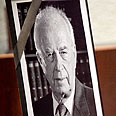
Sad sate of Rabin's memory
צילום: נועם מושקוביץ
Third of Israeli youths don't know what happened on Nov. 4, 1995
New study reveals growing number of Israeli teens youth don't know what happened on faithful night of November 4, 1995 when Yigal Amir shot and killed Yitzhak Rabin. Some 14% of haredi youths claim Rabin was killed by Arab
For many in Israel, November 4th 1995 is a date branded into their memory as a sad, traumatic and painful date, but 18 years after Israel's dovish prime minister Yitzhak Rabin was shot dead, the memory of his assassination seems to have faded.
A new online study conducted by i-panel from a statistic sample of 300 12-17-year-olds revealed the sad truth of the state of Rabin's heritage in Israel.
Related stories:
- Rabin's longtime driver passes away
- Rabin's sister: We learned nothing from assassination
- Bnei Akiva youth against Rabin memorial
When asked what happened in Malchey Israel Square (now Rabin Square) on November 4th of 1995 32.3% of respondents could not answer or answered incorrectly.

Memorial wall near Rabin Square (Archive: Yaron Brener)
An analyses of the findings revealed that only 21.4% of haredi youths knew Yitzhak Rabin was assassinated on that date. Religious - albeit not haredi- youths faired slightly better averaging at 51.4% and the religious Zionist youths managed 43.4%.
A solid majority of youths knew that Rabin was an Israeli prime minister and that Rabin Square was posthumously named after him in the wake of his assassination in the square.
A solid majority of 94.7% of youths knew that Rabin was shot by a Jewish assassin, but also in regards to this question haredi and religious youths fared relatively poorly: 14.1% of haredim and 8.1% of religious youths claimed Rabin was killed by an Arab.
Only 63% say political murder unjustifiable
Equally as concerning was the youths' position regarding future politically motivated assassinations. Some 56% of youths claimed that an additional assassination could possible take place in Israel.
The most irksome of responses was registered in regards the question of whether such an attack could be considered justified: 10% said that a politically motivated murder could be ideologically justified, 23% said they partially disagreed with the claim and only 60.7% said they completely disagree with the claim.
Of those who said they could ideologically justify a political murder, 24.3% were religious and 10% were secular.
Around 20% of those sampled expressed leniency towards Rabin's assassin, Yigal Amir: 18.7% of youth said they agree that after 18 years in prison, Amir's sentence should be reduced for good behavior. Haredi youth were even more adamant in their leniency, with some 57.1% responding positively to the idea of a sentence reduction. Only a third of religious youths answered positively to the same question.
On Saturday at 7:30 pm the main memorial ceremony for Rabin will be held in the square bearing his name. The ceremony will be attended by youth movements from across the political spectrum.
"I am glad to see that there is still a large percentage of youths who remember the murder, but the survey's results teach us that its lessons have still not been internalized," said Tomer Schmockler from the Dror Israel Movement.
"Israeli society and education system face a major educational challenge: To turn Rabin's murder into a warning sign to all of society. The ceremony this Saturday evening has a paramount importance in this regard. It will be a beacon to those who wish to protect Israel from those wishing to attack its democracy."
The i-panel study had a 5.8% standard deviation
- Receive Ynetnews updates directly to your desktop










